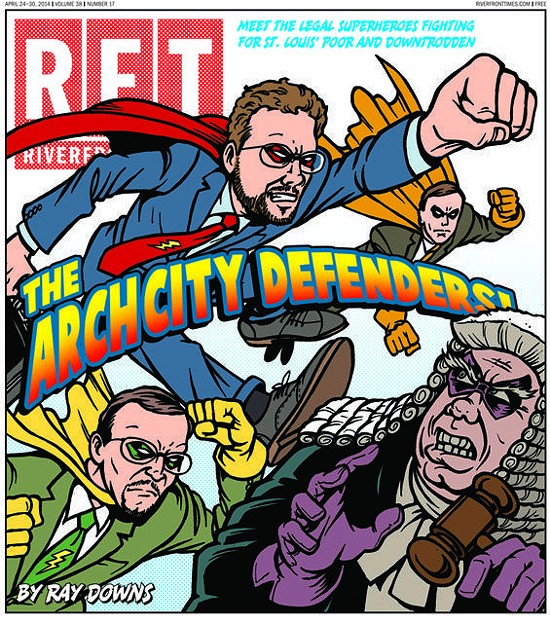Being poor can get you in a lot of legal trouble.
For many people, a $200 ticket is difficult to pay off. Unfortunately for many St. Louisans, the poorest municipalities rely on traffic ticket revenue to make up holes in their budgets. This means many people rack up tickets that they simply can't afford to pay off. And when those tickets turn into warrants, an arrest and jail time is a real possibility. It's a system that overwhelmingly afflicts St. Louis' poor and minorities.
Our feature story this week focuses on the work of ArchCity Defenders, a nonprofit legal group that provides a unique "holistic" legal model in which the goal is to get people out of their legal problems first, but also help the client improve their lives so they don't have to return to the courtroom. Sometimes this is drug addiction, mental illness, chronic homelessness, or other problems that can lead to legal infractions. In St. Louis, however, a big problem many poor people have is warrants for traffic tickets they have no chance of ever paying.
"I'd estimate that about 80 percent of our clients have warrants for traffic tickets," says Michael-John Voss, a co-founder of ArchCity Defenders.
And these tickets aren't just for running red lights or speeding. Many are a result of just not having enough money, such as expired registration, expired insurance and driving with a suspended license because of unpaid tickets. To make matters worse, public transportation is not a strong option for many people, especially in outer areas. So these fines pile up and can quickly become an insurmountable debt -- one that is a cash crop for many municipalities.
To get an idea of the prevalence of warrants for traffic and other municipal ordinances, know that several municipalities in St. Louis County issued more warrants in 2013 than the cities had people. Most of these cities have low income levels and majority black populations.
Out of 76 municipalities for which information about the number of warrants issued each year are available, 15 issued more warrants than the towns had people in 2013. Of these, 12 have a majority black population and only one - Beverly Hills, coincidentally - has a per capita income level above $20,000 per year. Most have per capita income levels under $15,000 annually.
Below is a chart of the five cities with the highest outstanding warrant to population ratio:
Of course, not everyone issued a warrant in a city is a resident. But the numbers are indicative of how aggressive ticket citing is, as well as the inability of people to pay. For example, the wealthier cities of Ladue and Chesterfield each issue warrants at a number far less than their populations. Ladue has 8,521 people and issued only 368 warrants last year. Chesterfield has nearly 48,000 people and issued about 2,400 warrants.
For those unable to pay off their fines, warrants can cause serious problems for people's lives. They might not qualify for housing assistance. They might not be able to get a job. And if they get arrested and need to spend time in jail, they may lose a job and then not be able to pay rent. ArchCity Defenders describes this as a "domino effect" of problems that make getting out of poverty more difficult than it already is. Read the whole story about how ArchCity Defenders is trying to do something about it.
- ArchCity Defenders: Meet the legal superheroes fighting for St. Louis' downtroddenFollow Ray Downs on Twitter:
E-mail him at [email protected].



